First meeting of SBSTA

|
|
|
|
Left: Joanna
Depledge, FCCC Secretariat [centre],
reads the list of accredited IGOs and NGOs
|
|
|
Right: Michael
Zammit Cutajar [centre] and SBSTA
Chair Harald Dovland [right]
at the opening of SBSTA-12
|
|
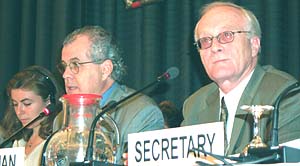 |
|
|
| It was standing-room only in
Plenary Hall 2 for the opening of SBSTA. |
|
|
|
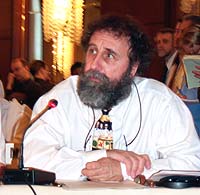
|
 Dr. Wulf Killmann, Chairman of Departmental Working Group
Climate in relation to Agricultural and Food Security (FAO) outlined
the FAO's many contributions to clarifications of Articles under
the Kyoto Protocol, and stated their desire to continue collaborating
with UNFCCC and other conventions (such as the CBD and CCD) to meet
common goals.
Dr. Wulf Killmann, Chairman of Departmental Working Group
Climate in relation to Agricultural and Food Security (FAO) outlined
the FAO's many contributions to clarifications of Articles under
the Kyoto Protocol, and stated their desire to continue collaborating
with UNFCCC and other conventions (such as the CBD and CCD) to meet
common goals. |
 Co-Chair Gwage noted the capacity building function of the
pre-sessional informal meetings with regard to the LULUCF Special
Report and progress on the data format for submissions due on 1
August
Co-Chair Gwage noted the capacity building function of the
pre-sessional informal meetings with regard to the LULUCF Special
Report and progress on the data format for submissions due on 1
August |
|
|
|
First meeting of
SBI
Delegates considered experiences with
the review of second national communications.
|
John Ashe
(Antigua & Barbuda), Chair of the Subsidiary Body for
Implementation (SBI)
|
|
|
FCCC Executive
Secretary Michael Zammit Cutajar presented a document
on late payment of contributions. He suggested consideration
of the option that Parties with arrears of one year or more
could be ineligible to, inter alia: host a session of the
COP/Subsidiary Bodies; be invited to or receive funding
to attend informal meetings; or be allocated membership
of the Bureau of the COP or its subsidiary bodies. Several
Parties stressed the need for further exploration of the
options presented by the Executive Secretary. Informal consultations
will be held on this issue.
|
|
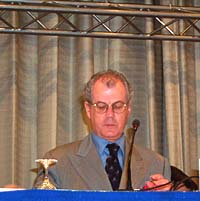
|
 Robert Watson, Chairman of the IPCC updated the SBI on
a working proposal, "Assessment of impacts and adaptation to
climate change in multiple regions and sectors in coordination with
IPCC". The proposal seeks to support capacity-building by raising
national/regional capacities in assessing climate change impacts
and adaptation studies, and weather-related emergency preparedness.
Robert Watson, Chairman of the IPCC updated the SBI on
a working proposal, "Assessment of impacts and adaptation to
climate change in multiple regions and sectors in coordination with
IPCC". The proposal seeks to support capacity-building by raising
national/regional capacities in assessing climate change impacts
and adaptation studies, and weather-related emergency preparedness. |
|
|
| Joint
SBSTA / SBI Meeting |
|
|
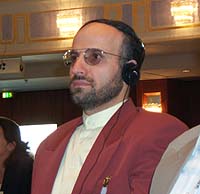
|
|
Above: Co-Chairs,
Bo Kjellen (Sweden) [above left]
and Mohammed Reza Salamat (Iran) [right]
reported on the recent workshops and informal meetings on
FCCC Article 4.8 and 4.9 and Protocol Article 3.14 (adverse
effects).
|
|
|
Nigeria,
on behalf of the G-77/China, stressed the need to negotiate
the issues as a package and said the outcome should be a
balanced set of decisions. He called on Annex II Parties
to commit specific financial resources for technology transfer
and capacity building by COP-6.
|
|
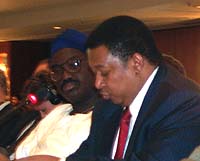
|
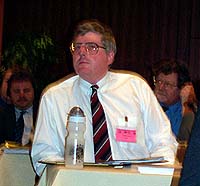
|
 Palau highlighted the vulnerability of SIDS to the
effects of climate change, and described his country's perspective
on climate change negotiations: "trust, but verify".
He stated that adherence to a compliance system with binding
consequences is an exercise of sovereignty.
Palau highlighted the vulnerability of SIDS to the
effects of climate change, and described his country's perspective
on climate change negotiations: "trust, but verify".
He stated that adherence to a compliance system with binding
consequences is an exercise of sovereignty. |
|
|
Samoa,
on behalf of AOSIS, called for study of the continuing
need for capacity building, and said that capacity building
needed to be consistent and continuous.
|
|
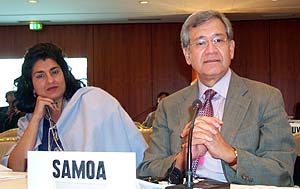
|
|
|
|
Portugal on behalf of
the European Commission, advocated
the adoption of a single draft decision on Article 4.8 and
4.9 and on Article 3.14. The G-77/China, with other non-Annex
I Parties, preferred two separate decisions
|
|
|
Zimbabwe
supported the G-77's call for two decisions on 4.8, 4.9 and
3.14
|
|
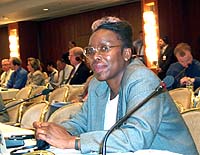 |
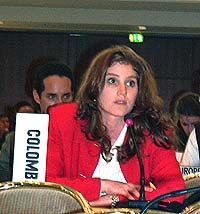 |
 Colombia said the CDM should: ensure sufficient additionality;
provide for equal treatment between the three mechanisms; recognize
the unilateral model for the formulation of projects; and focus
on prioritizing the sustainable development aspect of CDM
Colombia said the CDM should: ensure sufficient additionality;
provide for equal treatment between the three mechanisms; recognize
the unilateral model for the formulation of projects; and focus
on prioritizing the sustainable development aspect of CDM |
|
|
In the corridors
The spirit of cooperation generated during
the informal consultations was shaken late Monday, when tensions
in negotiations in the contact group on adverse effects spilled
over into the mechanisms group in what many saw as tit-for-tat reprisals.
The apparent reluctance of some Annex I Parties to discuss a consolidated
text based on Parties' proposals on adverse effects sparked a response
from Saudi Arabia in the mechanisms group, who sought to bring the
meeting to an abrupt halt. Several delegates observed that the incident
underlined the difficulties in moving forward on a "package" given
some Parties' insistence on simultaneous progress on all issues.
Others also noted that divisions within the G-77/ CHINA on adverse
effects were becoming more apparent by the day.
|